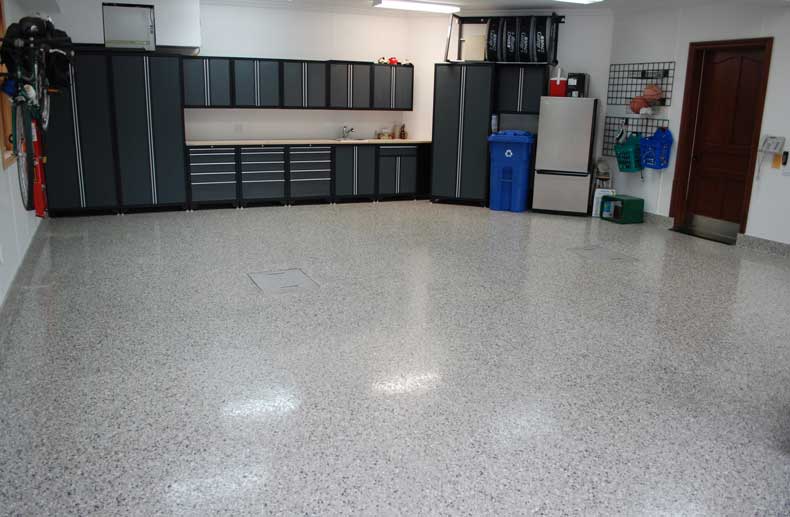Epoxy is a material used in various industries for its strength and resistance to wear and tear. If you’ve ever seen an epoxy floor coating, you know how tough and durable it looks. But what exactly is epoxy? How is it made? And what are the different types of epoxy coatings that are available?
This article will give you a crash course in all things epoxy. We’ll cover the basics of what epoxy is and where it’s typically installed. We’ll also touch on the different types of epoxy coatings that are available, as well as the benefits of using an epoxy coating.
What Is Epoxy?
Epoxy is a material made from two-component resins that cure to form a tough, durable finish. When these resins are mixed together, they create a chemical reaction that causes the mixture to harden into a strong, solid material. Epoxy is often used as a coating for floors and other surfaces because it resists wear and tear and is easy to clean.
There are two main types of epoxy:
- Thermoset epoxy – This type of epoxy is cured by heat and cannot be re-melted or reformed once it has hardened.
- Thermoplastic epoxy – This type of epoxy can be melted and reformed multiple times.
Where Is Epoxy Installed?
Epoxy is most commonly used as a floor coating in commercial and industrial settings. It can also be used on concrete walls, ceilings, and other surfaces. Epoxy coatings are typically installed by professional contractors.
What are the Different Types of Epoxy Coatings?
There are two main types of epoxy coatings:
Self-Leveling Epoxy
This type of epoxy is a two-part resin that is mixed together and spread on the floor in a thin layer. It levels itself out as it cures, creating a smooth, even surface.
Self-leveling epoxy is ideal for floors that are damaged or have an uneven surface. It can also be used to create decorative finishes, such as marble or terrazzo.
Not all self-leveling epoxies are the same; some are designed for specific purposes, such as protecting against chemical spills or providing slip resistance. Be sure to choose the right type of self-leveling epoxy for your needs.
Mortar Epoxy Coatings
Mortar epoxy is a three-part system that consists of a base coat, a color coat, and a clear topcoat. The base coat is applied first, followed by the color coat. Once the color coat has cured, the clear topcoat is applied.
Mortar epoxy is thicker than self-leveling epoxy and is typically used on floors that are in good condition. It can also be used to create decorative finishes, such as stenciled designs or logos.
Electrostatic Dissipating Epoxy Coatings (ESD)
ESD epoxy is a type of self-leveling epoxy that is mixed with a conductive additive. This additive helps to dissipate static electricity, making the floor safe for electronic equipment. ESD epoxy is typically used in data centers, computer rooms, and other sensitive electronic environments.
Self-Dispersing Epoxy Coatings (SDE)
SDE epoxy is a type of self-leveling epoxy that is mixed with a surfactant. This surfactant helps to disperse the epoxy evenly over the floor, reducing the risk of pooling or puddling. SDE epoxy is typically used in industrial settings where chemical resistance is required.
Vapor Barrier Epoxy Coatings
Vapor barrier epoxy is a type of self-leveling epoxy that is mixed with a vapor barrier additive. This additive helps to create a barrier against moisture, preventing the growth of mold and mildew. Vapor barrier epoxy is typically used in humid or wet environments, such as kitchens and bathrooms.
Flake Epoxy Coatings
Flake epoxy is a type of self-leveling epoxy that is mixed with flakes of color. These flakes create a speckled or mottled effect on the floor. Flake epoxy is typically used in garages, warehouses, and other industrial settings.
Metallic Epoxy Coatings
Metallic epoxy is a type of self-leveling epoxy that is mixed with metallic powders. These powders give the floor a shimmering, reflective finish. Metallic epoxy is typically used in high-end residential and commercial settings.
What Are the Benefits of Epoxy Coatings?
Epoxy coatings offer many benefits, including:
- Durability – Epoxy coatings are very tough and resistant to wear and tear. They can last for many years with proper care and maintenance.
- Ease of cleaning – Epoxy coatings are non-porous and easy to clean. Spills and dirt can be easily wiped up without leaving behind any stains.
- Slip resistance – Epoxy coatings can be mixed with additives that create a slip-resistant surface. This makes them ideal for floors that are exposed to water or other liquids.
- Chemical resistance – Epoxy coatings are resistant to many chemicals, including oils, grease, and cleaners. This makes them ideal for use in industrial settings.
- Impact resistance – Epoxy coatings are resistant to impact and will not chip or crack easily.
- Fire resistance – Epoxy coatings are fire resistant and can help to prevent the spread of fire.
- Stain resistance – Epoxy coatings are non-porous and resist staining from spills and dirt.
- Decorative finishes – Epoxy coatings can be mixed with colorants or flakes to create a variety of decorative finishes.
Which Epoxy Coating is Right For My Space?
Epoxy coatings are available in a variety of colors, finishes, and mixes. The right epoxy coating for your space will depend on the environment and the purpose of the floor.
For example, self-leveling epoxy is typically used in garages and warehouses because it is durable and easy to clean. Metallic epoxy is often used in high-end residential and commercial spaces because it creates a luxurious finish.
If you are unsure which type of epoxy coating is right for your space, consult with a professional contractor or installer. They will be able to assess your needs and recommend the best option for your home or business.



Recent Comments